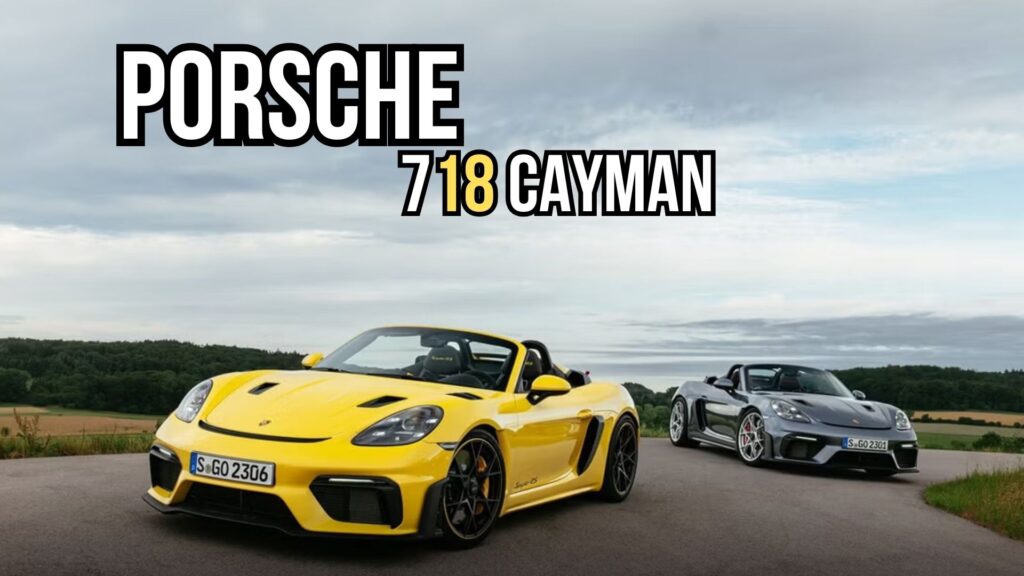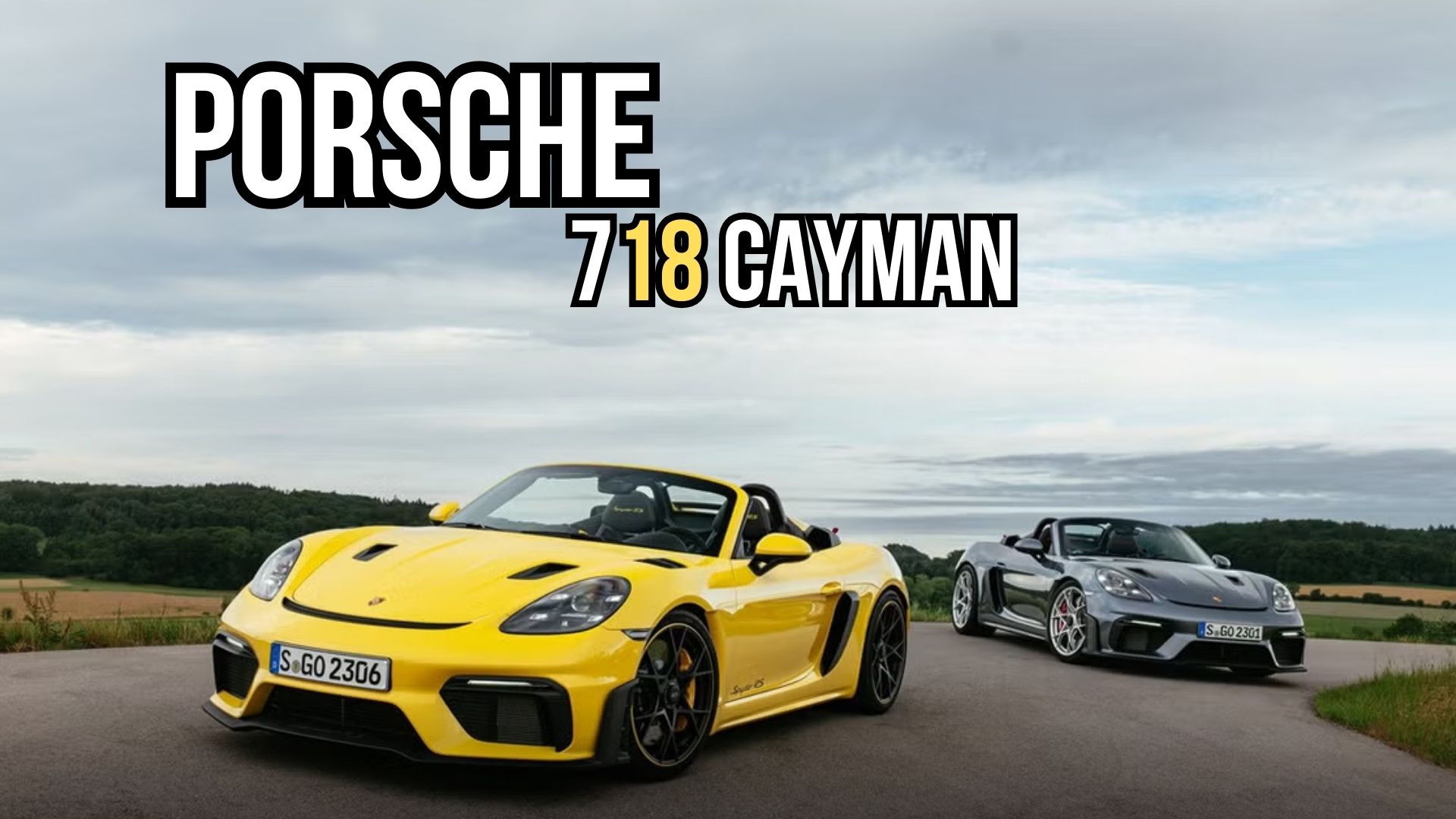Porsche has officially closed the order books for the 718 Cayman and Boxster, signaling the end of their combustion-powered era. Production of all variants, including RS models, will cease in October 2025. While no new ICE generation is planned, both nameplates will return as all-electric sports cars built on the Volkswagen Group’s PPE platform, ensuring their legacy continues in an electrified future.

Production Ends in 2025, Electric Successors Confirmed
Order Books Closed
Porsche has announced that it is no longer accepting new orders for the 718 Cayman and 718 Boxster. Customers may still purchase cars that are already in dealer inventory, but fresh orders are now unavailable. The move marks the winding down of two of Porsche’s most iconic entry-level sports cars, which have been in production in their current fourth generation since 2016.
Production Cut-Off
The brand has confirmed that production of all internal combustion engine (ICE) variants of the 718, including high-performance RS models, will officially end in October 2025. This will conclude nearly a decade of the fourth-generation “718” series and close a chapter that began when the Boxster was launched in 1996, followed by the Cayman coupe in 2005.
Summary Table
Feature |
Details |
|---|---|
Order book status |
Closed – only dealer stock available |
Production end |
October 2025 for all ICE 718 Cayman & Boxster variants |
Electric successors |
Cayman and Boxster to return as EVs on VW Group PPE platform |
ICE revival? |
None planned – future 718s will be EV-only |
New SUV by 2028 |
Compact ICE/hybrid SUV to launch alongside Macan EV |
Historical debut |
Boxster (1996), Cayman (2005), 718 generation (2016) |
Official Porsche site |
Why Porsche Is Ending the 718 ICE Models
Market Shift and Strategy
The discontinuation of the Cayman and Boxster ICE models is part of Porsche’s long-term electrification plan. While global EV adoption has slowed, particularly for luxury performance cars, Porsche is choosing a balanced path forward. This means pushing forward with electric development while continuing to offer hybrids and combustion-powered SUVs and sedans where demand remains strong.
Regulatory Challenges
The 718 line already faced early withdrawal in certain markets due to cybersecurity and emissions regulations in Europe. While limited editions such as the 718 Spyder RS temporarily extended availability, Porsche ultimately decided not to develop another combustion generation of the Cayman and Boxster.
What Comes Next: All-Electric Cayman and Boxster
PPE Platform Successors
Porsche has confirmed that the Cayman and Boxster names will return but exclusively as electric vehicles. They will be built on the Volkswagen Group’s PPE (Premium Platform Electric) architecture, which also underpins new EV models from Audi and Porsche.
Although Porsche has not revealed specifications yet, prototypes have been spied testing abroad, showing that the electric 718s will maintain a compact, lightweight, driver-focused philosophy similar to their ICE predecessors.
Design Continuity
Early testing cars hint at styling that reflects Porsche’s heritage while introducing sleeker aerodynamics required for EV efficiency. The EV 718s are expected to be positioned similarly in size and pricing to the outgoing combustion versions, ensuring continuity for buyers.
No ICE Revival for 718
Despite speculation, Porsche has categorically denied rumors of reviving the 718 twins in combustion form. Unlike the Cayenne and Macan, where ICE and EV models will coexist into the 2030s, the 718 will shift entirely to electric power. This makes the Cayman and Boxster among the first Porsche nameplates to transition completely away from combustion engines.
Porsche’s Broader Product Strategy
New SUV in the Pipeline
Acknowledging slower-than-expected EV demand, Porsche will not abandon ICE entirely. Instead, it plans to launch a new compact SUV around 2028. This model will offer both combustion and hybrid powertrains, complementing the electric Macan. Porsche CEO Oliver Blume emphasized that the new SUV will be “typical Porsche” but positioned uniquely between the Macan and Cayenne.
Long-Term Flexibility
Porsche has confirmed that while the 718 twins will be exclusively EVs going forward, other segments such as Cayenne, Panamera, and the upcoming SUV will maintain ICE and hybrid offerings well into the 2030s. This approach allows Porsche to remain agile while EV adoption continues to vary across global markets.
Historical Background
-
Boxster debuted in 1996, becoming a lifeline for Porsche during a difficult financial era.
-
Cayman joined the lineup in 2005 as a coupe alternative.
-
The current fourth generation “718” debuted in 2016, offering turbocharged flat-four and flat-six engines.
-
In India, the 718 range was discontinued in 2024, ahead of global changes.
-
Final ICE Cayman and Boxster cars will leave the assembly line in October 2025.
Frequently Asked Questions (FAQs)
1. When will Porsche stop making the current 718 Cayman and Boxster?
A. Production ends in October 2025, after which no new ICE 718 models will be built.
2. Can I still buy a new Cayman or Boxster?
A. Yes, but only from existing dealer stock. Porsche has closed new customer orders.
3. Will there be another combustion version of the 718?
A. No. Porsche has confirmed the 718 will not return in ICE form. Only electric successors are planned.
4. What will replace the 718 twins?
A, All-electric Cayman and Boxster models are being developed on the VW PPE platform and are expected to launch in the medium term.
5. How does this fit Porsche’s overall strategy?
A. While the 718 shifts fully to EV, Porsche will continue to sell ICE and hybrid Cayenne, Panamera, and an upcoming compact SUV well into the 2030s.
For More Information Click HERE.
